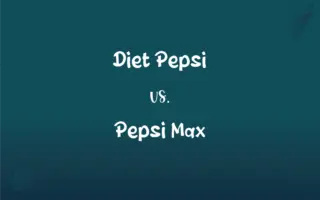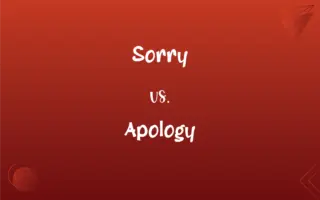Hyperbole vs. Idiom: What's the Difference?
Edited by Janet White || By Harlon Moss || Updated on October 23, 2023
Hyperbole is an exaggerated statement not meant to be taken literally, while an idiom is a phrase whose meaning isn't deduced from the words themselves.

Key Differences
Hyperbole is a figure of speech where exaggeration is used for emphasis or effect; it's an over-the-top statement. Idiom, on the other hand, is a phrase or expression that has a figurative meaning, distinct from its literal meaning.
Hyperbole often paints a dramatic picture to make a point stand out. For example, "I'm so hungry I could eat a horse," doesn't mean someone can literally eat a horse. Meanwhile, idiom like "kick the bucket" doesn't mean physically kicking a bucket but rather refers to dying.
In literature and daily speech, hyperboles serve to emphasize, dramatize, and make comparisons. They often employ humor to drive a point. An idiom enriches language by adding cultural context, making expressions more colorful and often more concise than a literal explanation.
When someone says a hyperbole, they usually don't expect to be taken literally; they're simply emphasizing a feeling or situation. With idioms, understanding can be trickier for non-native speakers because the phrases often don't translate directly.
While both hyperboles and idioms can add color and flair to language, the key distinction is their application. Hyperboles exaggerate for emphasis, whereas idioms convey figurative meanings that often diverge from their literal components.
ADVERTISEMENT
Comparison Chart
Definition
An exaggerated statement for effect.
A phrase with a meaning different from its literal interpretation.
Purpose
To emphasize or dramatize.
To convey figurative meanings.
Literal Meaning
Not intended to be taken literally.
Often doesn't match the figurative meaning.
Examples
"I've told you a million times."
"Bite the bullet."
Origin
Often based on amplification of reality.
Rooted in cultural contexts or historical events.
ADVERTISEMENT
Hyperbole and Idiom Definitions
Hyperbole
An overstatement to make a point stand out.
I could sleep for a year.
Idiom
A common expression understood figuratively, not literally.
He's the apple of my eye.
Hyperbole
A deliberate exaggeration for emphasis.
She runs faster than the wind.
Idiom
A set phrase with a unique meaning in a particular culture.
She let the cat out of the bag.
Hyperbole
A figure of speech not meant to be taken literally.
He's older than the hills.
Idiom
A phrase whose meaning isn't directly deduced from the words.
It's raining cats and dogs.
Hyperbole
A tool for creating a more striking image.
The book was so captivating, I got lost in it for eons.
Idiom
A linguistic expression that signifies more than its components.
Break a leg on your performance!
Hyperbole
A way to highlight the essence of a statement.
It was so cold, I saw polar bears shivering.
Idiom
A fixed combination of words with a figurative meaning.
He's barking up the wrong tree.
Hyperbole
A figure of speech in which exaggeration is used for emphasis or effect, as in I could sleep for a year or This book weighs a ton.
Idiom
A speech form or an expression of a given language that is peculiar to itself grammatically or cannot be understood from the individual meanings of its elements, as in keep tabs on.
FAQs
Why are idioms hard for language learners?
Their meanings often can't be deduced from the words themselves.
What is a hyperbole?
Hyperbole is a figure of speech involving exaggeration for emphasis.
Can hyperboles be negative?
Yes, like "This is the worst day ever!"
What is an idiom?
An idiom is a common phrase with a meaning different from its literal interpretation.
Are hyperboles lies?
No, they're exaggerations meant for effect, not deceit.
Is hyperbole common in poetry?
Yes, poets use it to evoke strong imagery.
Can a statement be both hyperbole and idiom?
Yes, some expressions can be both, like "I'm so hungry I could eat a horse."
Are idioms universal?
No, they're often culturally specific.
Why use hyperbole?
To emphasize, dramatize, or add humor.
Are idioms always fixed in structure?
Mostly, but some can vary slightly.
Can a hyperbole be subtle?
Yes, some are less overt than others.
How did idioms originate?
Often from cultural contexts, historical events, or linguistic evolution.
Is saying "I'm dying of laughter" a hyperbole?
Yes, it's exaggerating a feeling for effect.
What's an example of an idiom?
"Don't cry over spilled milk."
Can hyperboles be realistic?
They're based on reality but amplified.
How to identify a hyperbole?
Look for statements that seem exaggerated for emphasis.
Can using hyperboles be misleading?
If taken literally, yes, but they're typically understood as exaggerations.
Why are some idioms hard to understand?
Their figurative meanings can be distant from the literal words.
Are idioms metaphors?
Some idioms are metaphoric, but not all metaphors are idioms.
Are there idioms in every language?
Yes, idioms exist in all languages.
About Author
Written by
Harlon MossHarlon is a seasoned quality moderator and accomplished content writer for Difference Wiki. An alumnus of the prestigious University of California, he earned his degree in Computer Science. Leveraging his academic background, Harlon brings a meticulous and informed perspective to his work, ensuring content accuracy and excellence.
Edited by
Janet WhiteJanet White has been an esteemed writer and blogger for Difference Wiki. Holding a Master's degree in Science and Medical Journalism from the prestigious Boston University, she has consistently demonstrated her expertise and passion for her field. When she's not immersed in her work, Janet relishes her time exercising, delving into a good book, and cherishing moments with friends and family.







































































